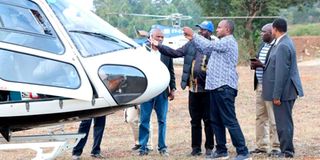Stoning of Raila’s chopper and our culture of violence

ODM leader Raila Odinga together and other leaders inspect the chopper that they were using. It was stoned by rowdy youth during Mzee Jackson Kibor's funeral at his home in Samitui farm, Uasin Gishu County on April 1, 2022.
“…on a day when distorted election results will set a bucolic country afire. The outside world is drenched with human noises of accusations and counter accusations, election rigging, and the miracle of mathematical votes that multiply and divide themselves… From the air, Nyipir peers down at an expanding abyss. His country, his home, is ripping itself apart. Stillborn ballot revolution.
These 2007 elections were supposed to be simple, the next small jump into a light-filled Kenyan future. Everything had instead disintegrated into a single, unending howl by the nation’s unrequited dead. This country, this haunted ideal, all its poor, broken promises. Nyipir watches, armpits damp. A view of ground-lit smoke. Dry lips. His people had never set their nation on fire before”.
These words from Yvonne Owuor’s novel, Dust, depict a country on edge. The novel is set against the backdrop of election-related violence. I remembered Owuor’s Dust, when violence reared its head on Friday, April 1, when former Prime Minister Raila Odinga’s helicopter was stoned at Kabenes in Uasin Gishu County.
Invaluable lessons
It is time to revisit Owuor’s novel as it has invaluable lessons that we should keep close to our hearts in the run-up and after the August 2022 elections.
This is especially true because Kenyans are obsessed with politics, maybe because it has its peculiar charm; a vision for what one critic called “yearnings after worlds half realised,” its hunger to change the world, and its fierce ambition. It can be a many-coloured career with its romantic variety of circumstances — what former US President Barack Obama described in his book, Audacity of Hope, as “the pleasures of politics — the adrenaline of debate, the animal warmth of shaking hands and plunging into a crowd”. In much of Africa, politics is accompanied by great wealth and a quick change in fortunes so the stakes are quite high.
Since there is much to lose for aspirants, politics has a darker side that can set a country on fire — the crowded vicissitudes of the tempestuous course one has to follow to reach the highest office in the land — becoming an idol of the people, a frontier man of action and one with the stolid vigour of legend. Danger lurks close. Politics can bring rejoicing and wailing, keenest delight and sharpest agony.
The politician, like the biblical King David with his sling as he advanced against Goliath, needs something of a cowboy’s maverick code, flashes of fierce vengeance, a strong arm, strategic skill and almost heedless, reckless daring — one must be chivalrous to his foes, ever watchful, sagacious and swift as lightning in action. This can often lead to violence in the electorate if words are not tempered with wisdom.
In the novel, Owuor reminds us of the post-election violence of 2007. She writes in a unique way — her poetic prose is spare, almost threadbare — honed to a fine edge with deadly rhythm for maximum emotional force. It hits like a punch in the gut, clearly showing us how election-related violence can destroy a country full of promise and turn it into the stuff of nightmares.
Brilliant engineer
The character Odidi, though a brilliant engineer, had become the leader of a criminal gang. After his violent death, his sister Ajany flies back to Kenya from Brazil. On the night in 2007 when the family takes the body from the morgue in Nairobi to fly it to Turkana for burial, the president is sworn in under controversial circumstances. Owuor writes: “On the ground, that night, in a furtive ceremony, beneath a half moon, a… man will mutter an oath that will render him the president of a burning, dying country. The deed will add fuel to an already out-of-control national grieving.”
Dust is written in the manner of a film noir, marked by the characteristic mood of pessimism, fatalism, and menace as the narrative unfurls. One is almost tempted to think the novel is too dark for comfort, but Kenya’s history has some dark patches we should highlight.
Obviously, the 2007 post-election violence is nothing any Kenyan should be proud of. However, we should remember its lessons to avoid such violence in future. The stoning of Odinga’s chopper and other acts of violence we have so far witnessed in the campaign trails should be a cause for worry and reflection.
In Dust, there are people from different origins and tribes who are central to the plot of the novel. Some of these people are the Turkana, the Luo, Somali traders, an Eritrean, an Indian shopkeeper, a Caucasian, someone from the Coast and many others. The message is clear; there is beauty in the diversity of our stories, cultures and perspectives. This is the tolerant, diverse and inclusive Kenya we should all aspire to and shun any manner of violence.
All acts of violence during and after elections should be dealt with decisively to discourage them from spreading. As Chinua Achebe once wrote, “People say that if you find water rising up to your ankle, that’s the time to do something about it, not when it’s around your neck.”
We need to have truthful conversations about the sporadic election-related violence now and chart a united way forward before the water reaches our necks. May the water never reach our necks again.





